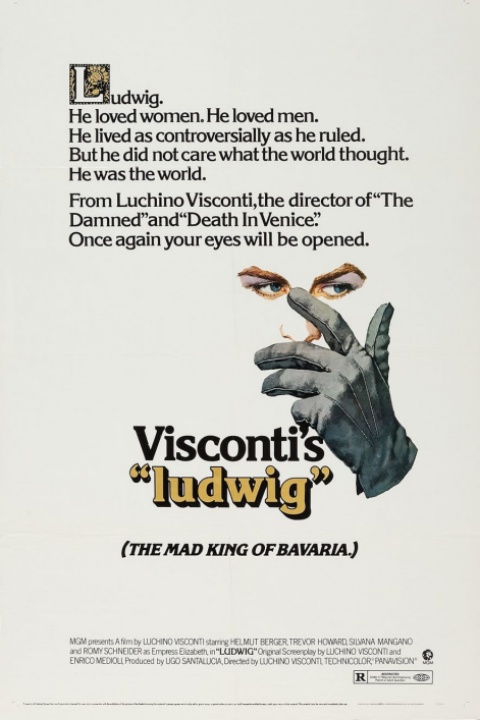Visconti’s screen treatment of the Wagner-obsessed King of Bavaria is inevitably tragic and melancholic, as this 4-hour epic charts his rise and downfall into madness.

Review #2,560
Dir. Luchino Visconti
1973 | Italy | Drama/Biography/History | 228 min | 2.35:1 | Italian
Not rated – likely to be NC16 for some nudity
Cast: Helmut Berger, Romy Schneider, Trevor Howard
Plot: Bavaria’s King Ludwig II, one of history’s most complicated figures, is a loner tormented by unrequited love for his cousin, Empress Elisabeth of Austria, an obsession with the music of Richard Wagner, and excessive state-funded expenditures.
Awards: Nom. for Best Costume Design (Oscars)
Distributor: Studiocanal
Accessibility Index
Subject Matter: Moderate – Monarchy; The Arts; Torment; Extravagance
Narrative Style: Slightly Complex
Pace: Slightly Slow
Audience Type: Slightly Arthouse
Viewed: MUBI
Spoilers: No
Luchino Visconti is no stranger to making period epics about the powerful and wealthy, most notably his magnum opus, The Leopard (1963), which is also one of my favourite films of all time.
Made ten years later, and with an even longer runtime, Ludwig is a decidedly more solemn picture about Ludwig II (also known as the Swan King), who came to power as the King of Bavaria in 1864 till his death a little more than two decades later.
Played by Helmut Berger in a tour de force performance that sees the tormented character come to life in regal costumes set against breathtaking royal and natural backdrops, Ludwig’s life story is captured in intricate detail, yet Visconti’s filmmaking is also about painting with large brushstrokes his larger-than-life personality.
“Monarchs like us do not make history.”
A lifelong lover of the arts, Ludwig famously became a patron of composer Richard Wagner (Trevor Howard), and infamously, turned into an eccentric spendthrift, building castles on a whim as he descended into madness. Romy Schneider has a role as Elisabeth of Austria, whom Ludwig becomes smitten with, but can’t possibly marry.
Despite running close to four hours, Ludwig has its own natural storytelling rhythm, allowing it to flow from ‘episode to episode’, which are separated by staged interviews of people who had served the king as they break the fourth wall and lament about their Majesty.
Despite tackling rather heavy themes of politics and war, as well as Ludwig’s homosexuality, Visconti always ensures that at every point in the film, the Swan King is treated respectfully despite his divisive personality and actions.
As such, what I found most resonating about Ludwig is that Visconti, through Berger’s performance, was able to humanise a complex person flirting with the possibility of self-destruction.
Grade: A-
Trailer:
Music:











